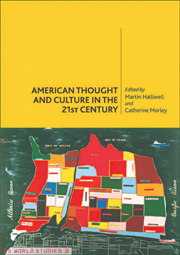Book contents
- Frontmatter
- Contents
- Acknowledgements
- Notes on the Contributors
- Introduction: The Next American Century?
- PART 1 POLITICS
- PART 2 SOCIETY
- 7 Contemporary Social Criticism
- 8 Religion in Post-Secular America
- 9 The US and Globalisation
- 10 The Future of Medicine
- 11 Technology in the 21st Century
- 12 America and the Environment
- PART 3 CULTURE
- Bibliography
- Index
8 - Religion in Post-Secular America
from PART 2 - SOCIETY
Published online by Cambridge University Press: 05 August 2013
- Frontmatter
- Contents
- Acknowledgements
- Notes on the Contributors
- Introduction: The Next American Century?
- PART 1 POLITICS
- PART 2 SOCIETY
- 7 Contemporary Social Criticism
- 8 Religion in Post-Secular America
- 9 The US and Globalisation
- 10 The Future of Medicine
- 11 Technology in the 21st Century
- 12 America and the Environment
- PART 3 CULTURE
- Bibliography
- Index
Summary
As with so much else in American society at the outset of the 21st century, what one thinks about the present and future status of religion in American life depends a great deal on what interpretive stance or narrative framework one brings to the subject. Who would have imagined, even two decades ago, the kinds of debates we would see roiling the post-9/11 world, at a moment when the immense motivational power of religion has roared back into view, as potent as a force of nature? At the dawning of the 21st century, the secular worldview, whose triumph once seemed so inevitable, now seems stalled, and even to be losing ground, or being superseded. Religion, in forms both traditional and novel, both quietly civil and wildly revolutionary, seems resurgent. The dream of a fully secularised public life, a condition that Richard John Neuhaus memorably labelled as ‘the naked public square’, seems to have lost whatever slender claims it may have had on the American imagination.
To provide a full account of the range of reasons for this ‘post-secular’ direction in American religious sensibility and commitment would take us far beyond the concerns of this essay. It should be stated, however, that for many western European observers the continuing American commitment to religion is a matter of great perplexity, running counter to so many of the most powerful secularising trends around the world.
- Type
- Chapter
- Information
- American Thought and Culture in the 21st Century , pp. 127 - 144Publisher: Edinburgh University PressPrint publication year: 2008



